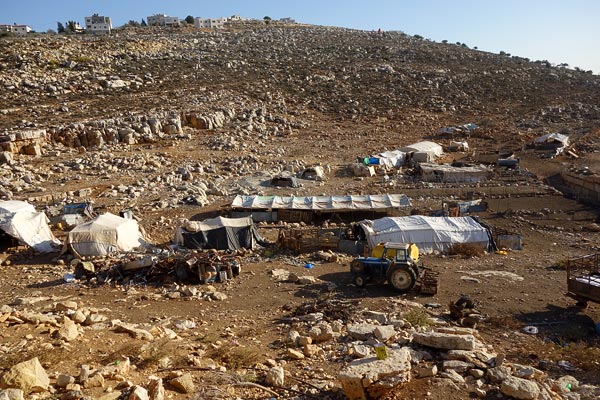The Judean Desert offers some of Palestine’s most dramatic and evocative scenery. Vast and arid, it’s home to herds of camels, raised for their milk and meat. And it’s home to nomadic Bedouin tribes. Scattered through the Palestinian countryside, like timeless limpets, are the scrappy shacks and goat corrals of Bedouin tribes. These proud families live off the grid with, I would imagine, a near-zero carbon footprint. Yet, like nomads around the world, they are being driven into a world where people have addresses and send their children to school to learn the prevailing values of that society at large. With the political tensions between Israel and Palestine (the walls, settlements, freeway construction, and aggressive water politics), I was told that Bedouin camps are now less mobile and stick to land near roads where they can tap into water mains. After so many centuries, more and more Bedouin families are finally settling down in towns and villages.



I’ll continue this Holy Land series until November 21st. Then, to celebrate my homecoming, I’ll give a live, free slideshow lecture on Thursday, November 21st at 7 p.m. P.S.T. in Edmonds, Washington. You can attend in person (registration required)…or watch the live webcast from anywhere in the world (no registration required). Learn more at Rick Steves – Holy Land: Israel and Palestine Today.
Rick:
You seem to have fallen under the spell of those “Wonderful Palestinians”….You keep making statements such as:”the dignity of these people (nomads) and their closeness to the land is emblematic of Palestinians in general.”
Please check your Wikipedia….the Bedouins are not now nor ever have been Palestinians. They are simply nomadic arab tribes from all the arab lands…without borders.
As a matter of historical fact the term “Palestinian” had always referred to the Jews of that area. The Palestinian Post was a Jewish paper that later became the Jerusalem Post. Furthermore, the Palestinian Brigade in the British army was a Jewish brigade that the British formed to help them defeat the Germans invading North Africa and headed toward Palestine. During this time many of the Arabs were ardent supporters of the Nazis and the German war effort. The use of the term “Arab Palestinian” and “Palestinian Land” was created by Arafat in the 1960’s along with the PLO as a tool for terrorism!!!
Therefore it’s impossible for the “Bad Israeli’s” to “STEAL” the poor Palestinians land…it never belonged to them!!!
Thank you Gollum, a voice of commonsense in a crowd of hysterical pablam.
Gollum and Jim must never have heard of the Palestinian Mandate! Which was not the first time the term Palestine was used for the people or area of Palestine. The root of the word Palestine goes back to the 5th century BC Ancient Greece. And some historians believe Palestine is a derivative of the term Philistine.
The claim that Arafat coined the term is revisionist history.
Yes Palestine probably came from the word Philistine. But during Hellenistic (Greek) control and early Roman control, the west bank area was known as Judea & Samaria. These names are used in the Bible and in Josephus’ writings. It was after the 135 AD revolt that the Romans changed the name to Palestine. Using that term before 135 is historically wrong. After that time that part of the Levant was called Palestine by Jews and Christians. Under the British mandate all people living there including Jews were called Palestinian, and this was noted as their country on their British passports.
YMedad, first of all thanks for tkiang the time to respond. Now, on to the substance of what you wrote:With all due respect, how do you define a state when you write that they “had a state” (in quotes)? Political activity? Opposition to the Jewish claim to the land? That’s not enough for statehood, sorry. The point of this poster as I see it is that it leads to discussions like these which show (a) the origin (which is relatively recent) and (b) the nature of Palestinian Arab nationalism (as evidenced by leaders such as Haj Amin al-Husseini — i.e. the goal being Israel’s destruction, not merely independence). So I think it is a very effective poster.Now, anyone with any sense of history knows that the Arabs rejected the Jewish right of return in Palestine throughout the 1920s, 30s, and 40s. Indeed they rejected the Balfour Declaration – as evidenced by the Peel Commission’s report and the riots in which they massacred Jews during this time. Some of them referred to the McMahon Pledge of 1915 and claimed the land was promised to them first (though McMahon himself rejected this claim). So no one’s saying that the Arabs didn’t reject the Jewish claim to the land way back in the early 1900s. Indeed, as Jabotinsky aptly puts it, many of them viewed the Jews as colonizers. However, my point (or at least one of my points) is that such feelings do not make it so. The Jews came to Palestine not on sufferance, but as of right, to paraphrase Churchill. You write, “The point is that we Jews have better historical, cultural, religious, moral and legal rights to be here.” And indeed I think that was the point of this cartoon. Even according to your arguments, the Palestinian Arab claims of statehood do not predate the Jewish return to the land. Moreover, you’d need to take a revisionist perspective (not Jabotinsky Revisionism) on history if you’re suggesting that the Palestinian Arabs considered themselves a distinct nation (as opposed to merely a part of either Greater Syria or part of the Arab nation) before the 1960s. And no, I’m not saying that you’re suggesting such a thing — you write “A delegation which traveled to London in early 1930 demanded the immediate formation of a national government in which THE ARABS [not “the Palestinians”] would have the majority.” But this is a nuance I think that is lost on readers like Marc. But again, Arab dissatisfaction with Zionism and the Jewish return to their homeland is entirely irrelevant to the question of statehood. The Mandate for Palestine, as I wrote earlier, recognized the Jewish claim to the land in international law — whether the Arabs liked it or not, it was not legally the Arabs’ land and they had no pre-existing state there (nor a right to one).Of course, it should be noted that the Palestinian Arabs did get a state on 78% of what was supposed to become the Jewish National Home in 1946, though the British effectively did this in 1922 in contravention of the Mandate. And of course some of their leaders did recognize the Jewish right to at least Western Palestine as part of early “two-state solutions” (e.g. the Feizal-Weizmann agreement of 1919 or the Treaty of Sevres, which was signed by the King of the Hedjaz). So there is really an answer to some of the poster’s questions I suppose.